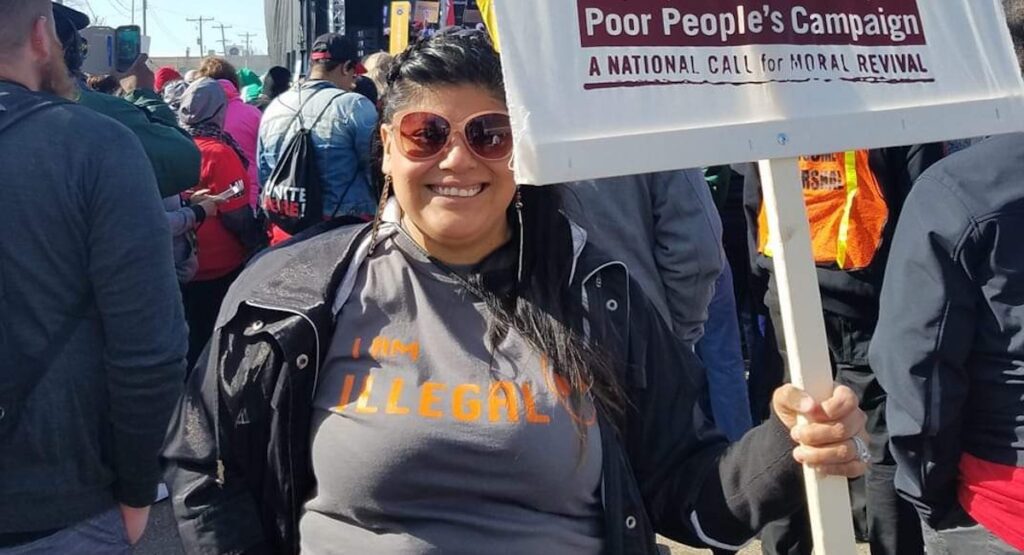
Kenia Alcocer is an undocumented immigrant from Acapulco, Guerrero Mexico. She is an organizer with Union de Vecinos in Boyle Heights (Los Angeles), and Co-Chair of the California Poor People’s Campaign: A National Call for Moral Revival.
As an undocumented person who arrived to the U.S. when I was four years old, I grew up listening in my Civics Class, History Class and Social Sciences Class that the most important and powerful right a Citizen has is the right to vote. This was something that a lot of people fought for during women’s suffrage, during the civil rights movement. People even died trying to obtain this right.
But as an immigrant rights organizer, questions are raised every Election Day about the right to vote and what it means for immigrant rights. The go-to strategy for most immigrant rights organizations during election season is to “get out the vote,” particularly of naturalized immigrants, Latinos, and APIA voters. Many advocates argue that immigrant voters, particularly Latino voters, can play key roles in states like Texas, Nevada, Arizona and Florida in key elections on federal and state levels, but face numerous barriers to becoming active in the electoral process. In the last election alone, immigrant voting in both registration and participation paled in comparison to native-born voting, with 61.7% of eligible voters registered to vote, and 54.3% of registered voters participating in the 2016 elections, compared to 71.2% registered to vote, and 62.1% of registered voters participating respectively.
This, of course, does not include un-naturalized and undocumented immigrants: in fact, nearly 20 million immigrants are ineligible to vote.
According to most recent estimates, there are currently 43.7 million immigrants living in the U.S. About 11.1 million (or 25.2%) of immigrants are undocumented. The rest are either lawful residents by either holding a green card or other form of documentation (11.4 million or 26.1%) or naturalized citizens (21.2 million or 48.7%). While naturalized citizens are eligible to vote, lawful residents and undocumented immigrants are not eligible. Factoring in age requirements of being 18 and over, this means that a little under half of the immigrant population (approximately 19.7 million people) are not eligible to vote. In addition, 8.9 million green card holders are eligible to naturalize, but application backlogs have skyrocketed to 730,000 applications under Trump. There is, therefore, de facto disenfranchisement taking place amongst immigrant communities: 82% percent of all immigrants have been living in the U.S. since or before 2009, meaning for many, they have living here for nearly 10 years or more and do not have a say in the policies impacting their lives.
As an undocumented person, I knew I could not vote, but this did not bother me. I came to realize at the age of 18 working on my first political campaign that the contribution of undocumented folks was much greater than the vote. Many undocumented youth and immigrants have, in addition to mobilizing their communities, sharing their stories, and risking arrest, gone out every election cycle to get out the vote and advocate for our communities’ interests.
However, undocumented and green-card holders should be eligible to vote, and should be included in any platform of voter empowerment. There are several initiatives already in place across the country allowing them or in conversation to do this, including in San Francisco for school board elections, and New York City, which has over 1.5 million green card holders. Non-citizen voting is not new: many states allowed non-citizens to vote until anti-immigrant/nativist surges in the 1920s; until a certain point, NYC allowed voting for non-citizens in school board elections since 1969. Many people in the U.S. are not aware that non-citizen voting has not been found to be unconstitutional.
Number of Disenfranchised Citizens & Resident Aliens, 1980–2012

The Poor People’s Campaign: A National Call for a Moral Revival understands how immigrants face the brunt of the “evils” we speak of in the campaign. According to the Migration Policy Institute, 64% of all undocumented immigrants are at or below 200% of the poverty line, and 61% of undocumented immigrants lack healthcare. Economic dispossession via neoliberal trade policies, increasing violence and militarization of the border and of Latin America, and climate change affecting crop yields, are spurring migration. The impacts of these policies on immigrants is, sadly, very clear this year, as attacks on immigrants have heightened in the form of parents and children being separated at the border, rising tensions along the U.S./Mexico border as a caravan of over 7,000 people, primarily Central American migrants, is expected to arrive, and a plan by Trump to end birthright citizenship through executive order. To top it off, studies have shown the correlation between being in poverty, and the hurdles of not being able to vote.
The power of the vote is not realized when the undocumented community, black communities, First Nations communities, Puerto Ricans, D.C. residents, the poor and criminalized communities are disenfranchised from this process. These millions of people are kept out of the electoral process and anyone who can vote must keep them in mind during this electoral season. And because voting is a source of power, voting is, in fact, one of the many lines of division we must overcome. As we organize and band together to fight against poverty, systemic racism, ecological devastation, the war economy and the distorted moral narrative, we demand also the right to vote and to participate in this democracy.